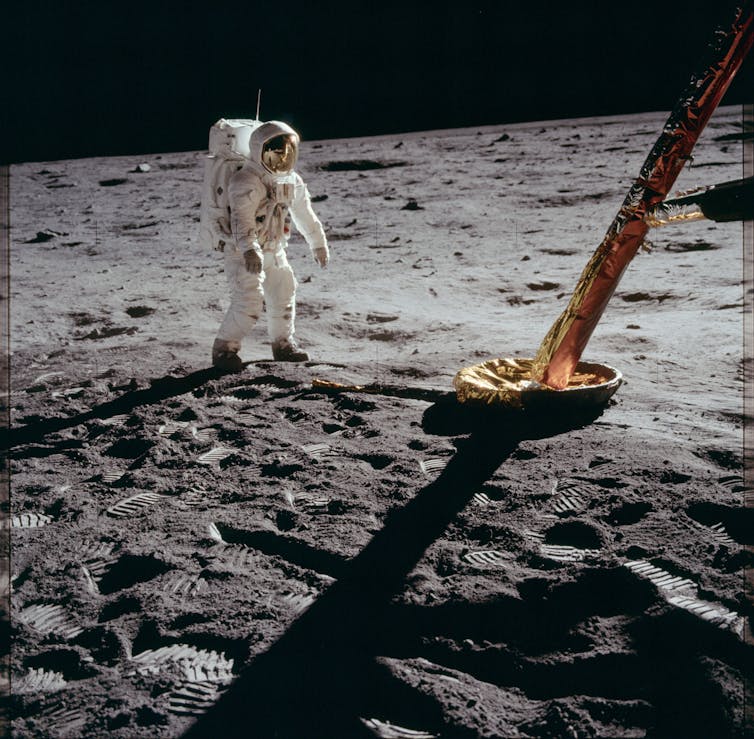By the end of this decade, nations and private companies may mine the lunar surface.
But as space becomes accessible to more countries and corporations, we have to stop and ask ourselves what commercial activities we want to allow, including on the Moon.
Now is the time to create rules and regulations that will protect humanity’s shared future in space and ensure that the Moon remains an icon and inspiration for generations to come.
1. Why is the moon mine?
NASA’s billion-dollar Artemis program isn’t just about sending astronauts back to the Moon. It is about paving the way for mining operations.
China is also on the same path.
All this has sparked a new moon race, in which private companies are competing to figure out how to extract the Moon’s resources, potentially selling them back to governments in the cosmic supply chain.
Currently, all supplies for space exploration are sent from Earth, making essential items like water and fuel extremely expensive.
By the time a liter of water reaches the Moon, its value becomes more than gold.
But by converting water ice on the Moon into hydrogen and oxygen, we can refuel spacecraft on the spot. This could make deep space travel, especially to Mars, much more feasible.
The Moon’s wealth of rare earth metals, essential for technologies such as smartphones, also means lunar mining could ease the pressure on Earth’s dwindling reserves.
Private companies can give tough competition to space agencies; A startup could be mining the moon before NASA lands its next astronaut.
2. Can mining change the way we view the Moon from Earth?
When material is removed from the Moon, dust flies up. Without an atmosphere to slow it down, this lunar dust can travel vast distances.
That surface material is “space weathered” and duller than the more reflective material below. Disturbing the Moon’s dust means that some parts of the Moon may appear brighter where the dust has moved up, while other parts may appear fainter if the dust has moved up again.
Even small-scale operations can disturb enough dust to cause visible changes over time.
Management of lunar dust will be a key factor in ensuring sustainable and minimally disruptive mining practices.

3. Who is the lord of the Moon?
The Outer Space Treaty (1967) makes it clear that no nation can claim “ownership” of the Moon (or any celestial body).
However, it is less clear whether a company extracting resources from the Moon violates this non-appropriation clause.
The issue was raised in two subsequent agreements.
The 1979 Moon Treaty claims the Moon and its natural resources as the “common heritage of mankind”. This is often interpreted as an explicit ban on commercial lunar mining.
However, the 2020 Artemis Accords allow mining, reaffirming the Outer Space Treaty’s rejection of any claims of ownership on the Moon.
The Outer Space Treaty also states that space exploration should benefit everyone on Earth, not just the rich countries and corporations that can afford to get there.
When it comes to resource extraction, some argue that this means all countries should share in the rewards of any future lunar mining efforts.
4. What will life be like for miners on the Moon?
Imagine you worked 12 hours straight in hot and dirty conditions. You’re dehydrated, hungry, and overwhelmed. Some of your colleagues have fallen or been injured due to exhaustion. All you want is to find another job with good safety standards, fair pay, and reasonable hours. But you can’t. You are stuck in space.
This dystopian vision highlights the potential dangers of rushing into lunar mining without addressing the risks to workers.
Working in low gravity conditions poses a health risk. Lunar miners are more likely to suffer losses due to:
- bone and muscle loss
- osteoporosis
- kidney and cardiovascular damage, and
- Weakened immunity.
Exposure to cosmic radiation not only increases the risk of various cancers, but can also affect fertility.
Lunar miners would also face long periods of isolation and intense psychological stress. We will need good laws and guidelines to protect the health and well-being of the space workforce.
Regulatory bodies enforcing labor rights and safety standards would be far away on Earth. Miners are left with little choice if they are asked to work unreasonable hours in unsafe conditions.
British astronomer Charles S. Cockell claims this makes the space “torture-prone”. He argues that powerful individuals may be able to abuse those who have nowhere else to go.
The Moon holds incredible promise as a milestone for human exploration and a potential source of resources to sustain life on Earth and beyond.
But history has shown us the consequences of unchecked exploitation. Before we can mine the Moon, we must establish strong rules that prioritize fairness, safety, and human rights.
,Author: Evie Kendall, Senior Lecturer in Health Promotion, Swinburne University of Technology, Alan Duffy, Pro-Vice-Chancellor Flagship Initiatives, Swinburne University of Technology)
,disclosure statement: Alan Duffy has received funding from the Commonwealth, ARC and CSIRO in space-related research grants. He works for Swinburne University of Technology, which is active in space-related research programs. Avi Kendall does not work for, consult to, hold shares in, or receive funding from any company or organization that would benefit from this article, and has no relevant disclosures from his academic appointment. Beyond affiliations.)
This article is republished from The Conversation under a Creative Commons license. Read the original article.
(Except for the headline, this story has not been edited by NDTV staff and is published from a syndicated feed.)







